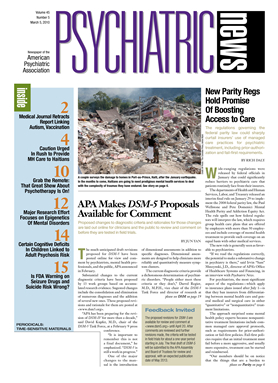“I promise to tell the whole truth and nothing but the truth,” defendants and witnesses proclaim in courtrooms across the United States each day.
But do they really do so? Maybe, and maybe not, because discerning truth in the forensic arena is a lot more challenging than many people realize.
This was the primary message of a session held at the January meeting of the American Psychoanalytic Association in New York City. The session concerned lying by adult defendants and witnesses.
Lying is “conscious and deliberate,” noted Howard Owens, M.D., assistant medical director of the Forensic Psychiatry Clinic at Bellevue Hospital Center in New York. “But there are many other ways of clouding the truth that aren't conscious and deliberate, and they can make the discernment of truth in the forensic setting difficult.”
For example, defendants and witnesses sometimes don't tell the truth because they are mistaken about what actually happened, other times because they have different perceptions of viewed events, and still other times to save face or avoid punishment. And defendants and witnesses may do what many people outside the forensic arena do, Owens noted—tell white lies to make others feel good or to spare them pain. In brief, we all lie sometimes—to ourselves, to the world. Defendants and witnesses are no different.
‘Devilishly Difficult’ to Discern Truth
So no wonder it can sometimes be so “devilishly difficult for forensic analysts or psychiatrists, as well as juries, to get at the truth,” said Owens.
When mental illness is involved, the challenge can be even greater, Moisy Shopper, M.D., a clinical professor of child psychiatry at St. Louis University, pointed out. Shopper said he once served as an expert witness in a murder case in which the defendant had paranoid psychosis. According to state law, the defendant was not morally and legally responsible while in a psychotic state. However, the defendant had bought a gun some time before killing his victim, implying that he had acted rationally and deliberately and was therefore morally and legally responsible for what he had done.
In fact, “there can be purpose even in psychotic behaviors,” Owens ventured. “Genuine dissociation is self-motivated and has a purpose even if unconscious.” So are people who commit crimes while psychotic or in a dissociated state aware of what they are doing, which is what determines if they are legally guilty? There are no easy answers, said Owens.
Moreover, discerning truth in the forensic arena may be tough because lawyers' and judges' perceptions of behavior may differ from those of psychiatrists and analysts, Shopper remarked.
For instance, lawyers and judges tend to view things in black and white, Shopper said. Is a person lying or telling the truth? Is he hearing voices or just saying so? Analysts tend to view things as more nuanced. Lawyers and judges want to know whether, at a particular time point, a person is guilty. In psychiatric or psychoanalytic treatment, assessment of a patient's psychological state may change or evolve over time.
Assessing Two Types of Truth
Linda Gunsberg, Ph.D., chair of the Family Forensics Training Program of the Washington Square Institute for Psychotherapy and Mental Health in New York, agreed: “Analysts and psychiatrists are interested in the narrative truth, whereas lawyers and judges are interested in the historical truth.”
Furthermore, analysts and psychiatrists tend to handle their material about a patient as objectively as they can, Shopper pointed out. In contrast, it is the role of a defense lawyer to present evidence selectively to give a client the best possible defense, while the role of a prosecutor is to present evidence selectively to convict an accused person.
A female analyst in the audience described an experience that illustrated this disconnect. A defense lawyer asked her whether his client (who was also her patient) had been receiving therapy for his psychiatric problem. “Yes,” she replied, “but he hardly ever showed up for it.”
“You'll probably think me a horrible person,” said the lawyer, “but all I'm interested in is whether he ever had therapy so that I can get him off.”
In spite of the slanting of truth by defense lawyers and prosecutors, or perhaps because the slanted views are pitted against each other, juries may detect the truth and a just decision may be reached, Shopper observed. In other cases, however, juries may not arrive at the truth because prosecutors do not share favorable evidence about the defendant with them. Currently, prosecutors cannot be prosecuted for withholding exculpatory evidence. However, a case before the Supreme Court may change that, Shopper noted. The case concerns two people who spent many years in prison because prosecutors withheld exculpatory evidence about them. The issue before the Supreme Court is whether these prisoners have a legal right to sue the prosecutors who withheld evidence.
But perhaps the best way for juries to detect the truth is by concentrating on the demeanor of defendants and witnesses, Gunsberg proposed. “To tell a lie requires a lot of psychic energy, and because it is so exhausting, the truth may finally emerge.”

